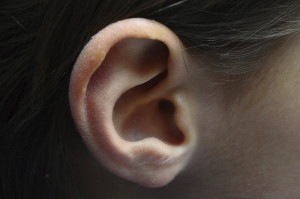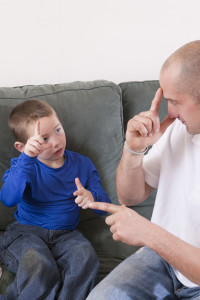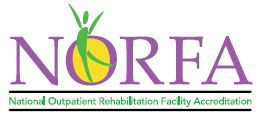Recognizing the Signs of Hearing Impairment in Your Child

Spotting the Causes
Statistics show that about 1 to 3 babies out of every 1,000 can be born with hearing loss. There are many factors that could potentially lead to this impairment, although no cause is found in nearly half of reported cases. Hearing loss can occur as a result of:
- Premature birth
- Neonatal Intensive Care Unit stay
- Exposure to extremely loud noises
- Infections from meningitis or cytomegalovirus
- Frequent ear infections
- Birth complications
- Family history of hearing loss
Identifying the Signs
It’s important to continually monitor your child’s hearing progress even if they have passed their hearing screening. Keep in mind that newborns are startled by sudden, loud noises and will begin to recognize their parent’s voice at three months of age. At six months, a child will turn their head toward a sound. By 12 months, he/she will imitate sounds and begin to produce simple words such as “mama” and “dada”.
Some hearing loss signs you can identify as your baby grows include:
- Trouble learning
- Requiring increased TV volume
- Inattentiveness
- Doesn’t respond to conversational speech or incorrectly answers questions
- Partial, poor or no speech
Making Strides
At Hope Therapy Center, we value your child’s well-being and will work as best we can to improve his/her hearing development. Our McAllen speech-language pathologist and occupational therapist employ caring and effective techniques to help you and your child progress together.
Learning Together: The Benefits of Attaining Sign Language with Your Deaf Child

Hurdling Over Obstacles
Statistics show that some parents of deaf children fail to learn sign language, making communication difficult. Additionally, some parents who attempt to learn to sign fail to master the language. The cause for this problem can vary with each parent. Some refuse to learn sign language because they see their child’s deafness as a “disability” or want to mold their child into a life of “normality”. Whatever the case, it’s very important to understand that your child’s development and your family’s interactions can be greatly improved by learning how to sign.
Understanding the Benefits
Learning a new language can be a challenge, no matter the circumstance. However, learning ASL can help you deal with the tantrums and impatience that your child may exhibit as he/she tries to communicate with you. Giving your child the opportunity to learn sign language and making sure you become fluent will allow them a chance to express how they’re feeling, what they need and what they want in a more effective manner.
Research has additionally revealed that a child who is exposed to sign language at birth will have greater chances of learning spoken language compared to kids who learn to sign later in life. These children have also shown to be highly successful in literacy and education.
Your Child is Our Priority
There’s absolutely nothing that can take the joy out of establishing a life-long connection with your child. Let’s help your child’s communication and language skills develop and grow with our speech-language pathologist and occupational therapist by his/her side.
Study Shows Sign Language Can Benefit Deaf Children

However, a large number of professionals believe sign language is a tremendous benefit for deaf children. A study conducted at La Trobe University in Australia further supports this side of the debate.
Educated Findings
The Australian study was released in 2012 and evaluated deaf adults who had learned sign language at different periods:
- At birth
- Between the ages of 2 – 8
- As a second language later in life
According to the results, the children who were exposed to sign language at birth were able to get a more accurate grasp of British Sign Language. They also had more success at learning language than children who learned sign language later in life. The researchers acknowledged that, even with the advancements in technology for cochlear implants and hearing aids, the benefits of early sign language are evident.
Expert Opinions
Unfortunately, research pertaining to the effects sign language could potentially have on a child are almost scarce. What little there is usually focuses on the positive effects of this form of communication. Some of the most recognized researchers and educators in the field of hearing loss admit there is no evidence against sign language and claim it can actually increase a child’s chances at learning spoken language.
Hope Can Help
At Hope Therapy Center, we understand that your child’s development is a top priority. For this reason, we’ll work diligently to help them flourish. Our caring speech therapists and pathologists will ensure that you and your child feel right at home.
Whether your child’s communicating ability needs to be evaluated with the best methods or is ready to begin developing with sign language, we can help.
Questions to Ask a Doctor About Your Child’s Hearing Loss
If your child has been diagnosed with hearing loss, chances are you have a long list of questions to ask your doctor. You’ll often wonder what can happen after the diagnosis or what you can do to assist your child. How can you ensure you’re asking the most pivotal questions? At Hope Therapy Center, we have crafted some questions to keep in mind when visiting your child’s doctor, along with the possible information you can expect in return.
How can my child’s speech and language development be affected by hearing loss?
It’s important to understand hearing is vital in any child’s speech and language development, whether it’s spoken or signed. Your child’s communication and language skills can be significantly affected depending on how early their hearing loss is diagnosed.
What was the cause of my child’s hearing loss?
Hearing loss in children is often caused by hereditary factors, which make up half of all cases. A quarter of hearing loss in children is attributed to illnesses, while the remaining 25% is not identified.
Are there any tips for communicating with my baby or child?
One of the most important things to do for your child or baby is to make sure they have a clear view of your face when you speak to them. Make sure to make eye contact and keep any other noises (TV, radio, etc.) low so they can listen to you as best they can.
Communication with your child is a key factor in assisting them, so speak with them often during the day, read to them, enjoy activities where communication is required and, most importantly, enjoy your time with them.
Your Child is Our Priority
We’re here to assist you every step of the way if your child has been diagnosed with hearing loss. At Hope Therapy Center, our professional speech-language pathologist and occupational therapist are ready to assist you and your child in the journey toward better communication. The time to act is now, so visit our location in McAllen or give us a call for more information about our services.
Life After a Cochlear Implant Surgery
A cochlear implant can provide hope for children with moderate to severe hearing problems. This complex device, made up of a microphone, speech processor, transmitter receiver, and an array of electrodes, can give a representation of sound and the opportunity to understand speech to many. While most families would jump at the opportunity to give their little ones the chance to hear, it’s important to understand what must be done after the implant surgery to ensure the transition into hearing is smooth and swift.
Immediate Effects
Like most surgical procedures, a cochlear implant surgery will have immediate effects on the body. Most patients will exhibit instant outcomes, such as pressure on the ear, dizziness, nausea, disorientation, and sore throats. It’s important to understand that there will be many things to do immediately after the surgery.
Your child will have to keep his or her bandages and stitches for a while and should follow a strict cleaning regimen to keep the sensitive area from infecting. Your child will not be able to hear immediately after the operation, but will instead have to wait anywhere from 3-6 weeks in order for the device to be turned on.
Learning to Hear
As a parent, we know you want to be involved in everything your child does, and the process of programming a cochlear implant is no exception. A professional audiologist can make the most out of teaching your child to get used to the implant if a parent is around to assist and make him or her feel as comfortable as possible. During the programming process, audiologists will adjust the sound processor to make sure it fits your child flawlessly.
Speech therapists and pathologists from the highly-trained staff of Hope Therapy Center in McAllen can then work with your child to take them through the hearing process at their own pace. The learning process can be lengthy and rough, but a team effort from our professionals can help learning to hear become a fun experience through exercises such as making noises with your child to help them become familiar with them, or talking about things we do on an everyday basis while they are performed.
Hope is Here
Auditory problems can pose a tough challenge for any parent, but know that you are not alone. Hope Therapy Center is determined to be by your child’s side through the journey to hearing. For more information about our services, contact our offices in McAllen today.
Is Your Child in Need of Speech Therapy?
A child learning to speak is one of the most moving experiences for a parent, but when do the cute mispronunciations and stutters become warning signs? The feeling of suspecting your child’s speaking abilities are not as good as they should be can be extremely worrying for any parent. Friends and family may tell you some children are simply late bloomers, but there are several signs you should not ignore. Identifying them is key in providing your child with the prompt care they need.
Read the Signs
Children between the ages of 18 months and 3 years will often mispronounce many words that will have you guessing what they’re trying to say. While this is normal, you should be able to understand what they’re saying soon after. An evaluation of your child is strongly advised if they exhibit the following symptoms:
- Overly sensitive to sounds such as vacuums, hair dryers, etc.
- Has trouble pronouncing vowels
- Only speaks by using vowels, such as saying “o” for “dog”
- Only uses a word once with significant time passing before using it again
- Does not seem angry, agitated or frustrated when you don’t comprehend them
- Appears to not be progressing in speech
- Uses single words rather than complete sentences
If your child has not started to talk or is doing so at an unnaturally slow pace, seek professional help immediately.
The Care Your Child Needs
We understand that speech disabilities affecting your child can be extremely stressful, but know that the staff of Hope Therapy Center in McAllen is ready to help. Our expert speech-language pathologist will work to evaluate your child’s current speaking abilities by using the best methods in the field and will continue implementing them to help overcome an articulation disorder. Being a parent should be an experience full of joy and we want to help you keep it that way.
Hope is Here
At Hope Therapy Center, we understand you would do anything for your child, and we will too. If you believe your child is in need of speech therapy, don’t hesitate to contact Hope Therapy Center today.
How to Cope with Your Child’s Hearing Loss
As a parent, knowing that your child has been diagnosed with hearing loss can be a painful experience. You’ll immediately want to learn about the condition and do everything possible to give your little one a chance to hear. Even though this is a venerable purpose, it can be difficult to accomplish. The most important thing to do when your child is diagnosed with hearing loss is to follow a strategy that will help you and your child make progress together.
Learning is Important
To increase the amount of help a speech-language pathologist and an occupational therapist can give your child, it’s important to educate yourself on hearing loss. One of the best approaches you can take is talking with parents of children with hearing loss to get a personal view about the condition. Investigate the services available for your child and see what you can do as a parent.
Don’t Forget to Be a Parent
We understand that your child is the most important thing in your life and we know that you’ll do the impossible to help them, but don’t let your efforts keep you from being a parent. Losing yourself in research can be an easy thing to do but remember that spending time with your child is just as important. One of the things that makes you such an important part of a therapy team is the fact that you know your child like no one else.
Organization is Key
The amount of information you are presented with can be overwhelming. To prevent stress and confusion, organize everything you find into files that can be easily accessible. Prioritize the most important information and keep sources like phone numbers, websites and agencies handy for quick access.
We’re here to Help
We understand the stress that a hearing loss diagnosis can bring, but know that you’re not alone. At Hope Therapy Center in McAllen, our professional speech-language pathologist and occupational therapist are determined to help you and your family make steady progress towards a life of normality. If you need more information about our speech therapy services, don’t hesitate to contact us.


